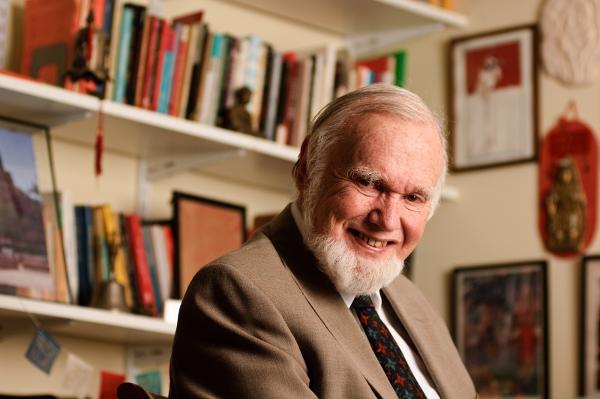Necrology
Because Hamilton Remembers


Jay Williams ’54, P’83, GP’11,’19
Dec. 18, 1932-Jun. 21, 2023
Walcott-Bartlett Professor of Religion Emeritus Jay Williams ’54, P’83, GP’11,’19 died on June 21, 2023. Professor Williams earned his divinity degree from Union Theological Seminary and his doctorate from Columbia. He enjoyed a long, fulfilling career, one he would be the first to acknowledge came to him most serendipitously.
The son of Rev. Jay G. Williams, Hamilton Class of 1923, and the former Mary Craig, he was born in 1932 in nearby Rome, N.Y., where he attended a one-room schoolhouse until the eighth grade. He spent much of his childhood working on the family farm and delivering milk for the Craighurst Dairy. Although Williams attended the Rome Methodist Church, he was raised as a Quaker, as his family was very active in the local Friends Meeting. He graduated from Rome Free Academy in 1950.
When it came time to consider college, it never occurred to Williams to apply anywhere but his father’s alma mater, Hamilton. He was accepted and focused his studies in English literature and philosophy, receiving honors in both philosophy and public speaking. Most of his extracurricular activities revolved around the Glee Club, the Student Christian Association, and Tau Kappa Epsilon fraternity where he served as president his senior year.
After graduation Williams had little idea where his career path would take him. What he did know was that it would not include farming or business. “I would have gone into philosophy, but I really did not like very much what was happening in philosophy — A.J. Ayer and Logical Positivism, et al. — so I thought I would try theology. Perhaps in seminary I would find some answers to nagging questions. I applied only to Union Theological Seminary in New York and happily was accepted,” he later wrote.
The decision to pursue his Master of Divinity proved key to shaping Williams’ future — perhaps second only to his decision to marry Hermine Weigel on Sept. 9, 1956, while in seminary. The two would raise four children and enjoy 62 years together. Hermine was an organist and choir director for several local churches, taught part time for many years at Hamilton, and produced scholarly works in the field of musicology. Jay called her “the real scholar of the family.”
While at Union, Williams studied under noted theologists Paul Tillich and Reinhold Niebuhr and wrote his thesis on Soren Kierkegaard’s conception of the individual. He studied Hebrew, Greek, and some Aramaic. After considering advanced work in biblical studies, he decided to continue his education in the field of the philosophy of religion and began work on his Ph.D. at Columbia University. Prior to starting his dissertation, however, Williams was considering taking a hiatus from his studies to earn some money.
“As chance would have it, I met Warren Ost, the director of A Christian Ministry in the National Parks, in which I had participated after my first year at Union, and was offered, quite out of the blue, the position of associate director. I accepted and for the next two years spent much of my time traveling to theological seminaries to recruit the staff for the program or to the National Parks in the summer to supervise what was going on. It was a fabulous way to see the country, visiting parks from the Everglades to Mt. McKinley, from Isle Royal to Big Bend and Sequoia,” Williams wrote.
Realizing he needed to get back to his dissertation and finish his degree, Williams resigned from the parks position and was headed back to Columbia when, in 1960, he was unexpectedly offered a temporary appointment in Hamilton’s Religion Department. He took the job while working on his dissertation (on Benjamin Whichcote and the Cambridge Platonists) remotely.
Proving that “temporary” is a relative term, Williams completed his Ph.D. in 1964 and soon thereafter earned tenure at Hamilton. He would spend the next five decades teaching more than 30 courses on College Hill, ranging from The History of Western Religious Thought to The World of Zen. “When something interested me,” he wrote, “I went to work on it until I was knowledgeable enough to teach a course on the subject. … I traveled to the countries I taught about to understand better the culture. I very much dislike today’s emphasis on specialization. All knowledge is interrelated. To know one thing is hardly knowledge unless that knowledge is somehow connected with everything else.”
Williams chaired the Department of Religion (now Religious Studies) from 1968 to 1990, and directed the Asian Studies Program. One former student noted, “He has the gift of combining brilliant lecture skills with intellectual engagement. He’s a great teacher as well as a supportive, approachable mentor.”
A prolific author and presenter, Williams explored the thought of both West and East, writing about the ancient Hebrews, Jesus and Jewish history, as well as a previously unknown gospel from China’s Tang dynasty. His books include two focused on the philosophy of religion, The Riddle of the Sphinx (1990) and A Reassessment of Absolute Skepticism and Religious Faith (1996); a biography of the biblical scholar Edward Robinson (Samuel Kirkland’s son-in-law); collections of poetry; and a work exploring the life and work of cartoonist Thomas Nast.
In 2004, he presented the half-century annalist letter for the Class of 1954, noting that “education in the liberal arts was and is not so much the presentation and absorption of huge quantities of material as it is the development of critical skills and habits of mind, for once those are developed one can use them to explore anything from black holes to voting trends to the shamanism of Ulan Bator.”
Williams also gave the Class & Charter Day address in 2005. In 2011, he was recognized by the Alumni Association with its Distinguished Service Award, with the citation noting: “This year, 2010-11, marks your 51st year of full-time teaching at Hamilton. Only Edward North, professor of Greek from 1843 to 1902, has exceeded this feat of longevity, and few have had such a meaningful impact on the lives and worldviews of so many students.”
Williams retired from teaching a full courseload in 2012 as the Walcott-Bartlett Professor of Religious Studies. He remained active teaching, publishing, and exhibiting from his collection of photographs and illustrations. His extensive collection of 19th-century illustrations by Thomas Nast, Winslow Homer, and Frederick Remington, among others, was exhibited in a number of major art galleries. In 2019, Williams made two large gifts of works to Hamilton’s Wellin Museum, including 1,019 prints by Nast and 152 by Homer.
In addition to his teaching duties, William conducted services and preached in numerous churches and chapels. He was ordained to the ministry at the First Presbyterian Church in Rome, N.Y., and later served as an interim pastor at Moriah Presbyterian Church in Utica, N.Y., and at the Welsh Congregational Church of New York City.
A constant presence at Hamilton basketball games and in the gym’s weight room, he was an active member of the Unitarian-Universalist Church of Utica, poet, author, minister, teacher, and baseball enthusiast, but above all, a loving husband and father.
Jay Williams is survived by four children, including Jay G. Williams III ’83; eight grandchildren, including Thomas E. Williams ’11 and Rebecca Williams ’19; three step-grandchildren; and one great grandchild. His wife predeceased him in 2018.
Note: Memorial biographies published prior to 2004 will not appear on this list.
Necrology Writer and Contact:
Christopher Wilkinson '68
Email: Chris.Wilkinson@mail.wvu.edu

The Joel Bristol Associates
Hamilton has a long-standing history of benefiting from estate and life payment gifts. Thoughtful alumni, parents, and friends who remember Hamilton in their estate plans, including retirement plan beneficiary designations, or complete planned gifts are recognized and honored as Joel Bristol Associates.
